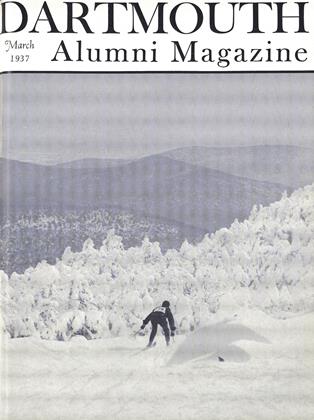By Herbert Faulkner West '22. Privately printed, 1936.
The strange chemistry of Robert Cunninghame Graham's mind, aristocratic by instinct, habit, and temperament, and at the same time, of an indomitable individualism, pulsating with anarchical impulses in which a craving for justice and a lofty sense of humaneness were strongest, made of him an exceptional figure whose traits have been brought out in fuller relief on the occasion of his recent death. Professor West condenses in his essay on Don Roberto—the Spanish inflection which Cunninghame Graham's intimates in Spanish America used to give to his name—the more ample portrayal that he has made in his understanding biography. Beyond that, it is a moving valediction to an admired friend.
As a subject of study, Cunninghame Graham presents the most fascinating perspectives, both as a man and as a writer. He sought for his life a path of beauty, in which the Scottish lair of royal ancestry, the man of wealth disdainful of material possessions, the insatiable traveler ever escaping from the trammels and smugness of civilized society, the consummate rider and lover of horses equally at home among the rigors of the Argentine pampas and in the urbane staidness of Hyde Park, the sparkling causeur and short story writer, the historian of the true but incredible epic of the conquistadors, all blended with virtu and bravura of true Renaissance proportions. In Don Roberto, there was a perfect adequacy of his own powers and experiences to a figure of magnificent virility.
Professor West's essay is an appropriate point of departure for a sympathetic acquaintance with these multiform aspects of the personality of Cunninghame Graham. It beckons the reader to make discoveries by himself in the singularisinioescritor, as W. H. Hudson called him, who has helped to clear the world of some of its most suffocating platitudes and complacencies.
 View Full Issue
View Full Issue
More From This Issue
-
 Article
ArticleYANKEE INGENUITY HAS NOT ENTIRELY DISAPPEARED, A TALE OF "AUSTIN'S ANTS" AND THEIR ANTICS
March 1937 By JOHN HURD JR. '21 -
 Class Notes
Class NotesClass of 1930
March 1937 By Albert I. Dickerson -
 Class Notes
Class NotesClass of 1926
March 1937 By Charles S. Bishop -
 Class Notes
Class NotesClass of 1936
March 1937 By Richard F. Treadway -
 Class Notes
Class NotesClass of 1911
March 1937 By Nathaniel G. Burleigh -
 Article
ArticleHanover Browsing
March 1937 By HERBERT F. WEST '22
J. M. Arce
Books
-
 Books
BooksFaculty Articles
MARCH 1965 -
 Books
BooksTHE PSYCHOLOGY OF RADIO
January 1936 By C. N. Allen '24 -
 Books
BooksJONES VERY: THE EFFECTIVE YEARS,
NOVEMBER 1967 By EDWARD M. POTOKER '53 -
 Books
BooksSome Makers of American Literature
April 1924 By F. P. E. -
 Books
BooksWHERE THERE'S SMOKE,
April 1947 By H. M. Dargan -
 Books
BooksBriefly Noted
FEBRUARY 1969 By J.H.




